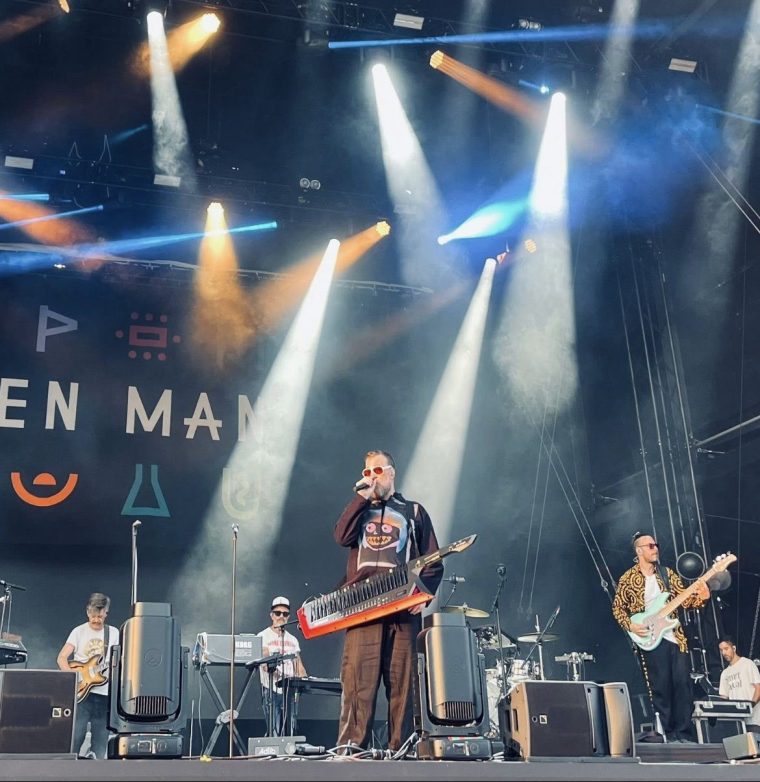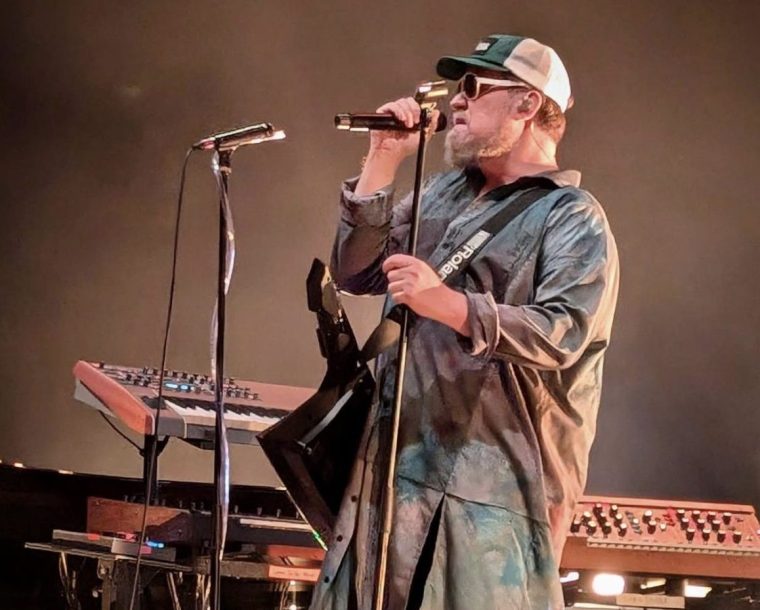Outside, it is a lovely warm summer afternoon. Inside a slightly too-dark pub in central London, however, John Grant is spewing forth – albeit in that gentle giant manner of his – about Donald Trump and the political climate in America.
“It’s just grotesque and disheartening and infuriating. Anybody that doesn’t see the parallels between the Nazis and what’s happening in the States right now just isn’t paying attention.” We’re talking as Trump’s links to Jeffery Epstein are headline news. “But there’s no way that [his supporters] are going to abandon him. I’m not even sure if he raped a child, if he committed sodomy on live television [they’d abandon him] at this point.”
He knows how he sounds to some when he talks like this. “The comeback is often, ‘oh, you elitist, you think you’re so much smarter than everyone.’ No, but I can see that the guy’s a card-carrying c**t that you couldn’t trust. That you would is just mindboggling.”
There’s a low-key resignation to Grant’s prognosis. “[Trump’s] not going. He has no intention of leaving ever again. He wants what Putin has – unlimited having the last say in everything, and there being only the pretence of elections.” He shakes his head. “People still think that’s being overdramatic. No, 6 January was the very, very, very last time that you could say you’re being too dramatic.”
In a strange sort of way, Grant feels vindicated by what he sees. The 57-year-old grew up in Michigan, then later Colorado; knowing he was gay from the age of five othered him in a profoundly damaging way. The guilt and shame of his oppressed, deeply religious adolescence, followed by the subsequent homophobic abuse, led to a lifetime struggle with self-esteem, intimacy issues and drink, drug and sex addiction that led to a HIV diagnosis, which he made public onstage in 2012.

But it has proved febrile ground creatively. Grant’s canon, from 2010’s ballad-heavy debut The Queen of Denmark via soft rock and different shades of electronica, has made a sardonic virtue of his trauma; no subject is beyond fierce, candid examination. His songs have acted as lifelines – he tells me they are both “a defence mechanism and a survival mechanism”.
But it is precisely because of this past, he says, that he could foresee what was coming with Trump’s political emergence. “When you saw who was reacting to the message in 2015 it was clear what’s coming down the pike. It’s the same people that I was dealing with when I was young. These same narcissist, thug, bully, Bible-bashing, hypocritical assholes. But now we’ve got somebody making it possible for these people to say, in broad daylight, ‘yeah, I am a fascist. Yes, I am a Nazi. What of it? It’s as equally valid as whatever bullshit you believe in.’ That’s new and alarming.”
Grant has lived in Iceland since 2011; does this make him more wary of going to America, travelling the country on tour? “No, because my people are all over the place. We need to show up for each other. It’s always been true that you could be shot in the head at any moment for any reason in the United States,” he says, pre-dating the killing of Charlie Kirk by six weeks. “It’s really no different now.” Are there any grounds for optimism? “Maybe not in my lifetime, but it will flip over again. Look, I haven’t committed suicide, so obviously I believe that there’s a reason to show up. But it looks really ugly out there right now.”
The presence of Trump has perhaps inevitably crept into Grant’s music. His 2018 track “Smug C**t” was a direct swipe at Trump; the 2021 album The Boy from Michigan was a much more personal reckoning with his upbringing and his place within the Trump-shaped America. His latest album, The Art of the Lie, was released last June (the final leg of a UK tour starts next month).

“It felt like ancient history a month after it came out,” he says. But it is a luscious, electronically layered, subtly funky collection of typically Grantian topics: the key trilogy of songs – “Daddy,” “Father” and “Mother and Son” – look at his evolving feelings towards and relationship with his religious, conservative parents (his mother died of cancer in 1995 after refusing treatment due to her beliefs; his father, an engineer, is now elderly).
While the title was a sarcastic play on Trump’s book The Art of the Deal – and taken from a line in the song “Meek AF” that posits Maga’s win-at-all-costs attitude as America’s new doctrine – the album’s name was actually more about Grant himself. “It has a lot to do with the lie of thinking that I’m not equal to other humans because of being gay, and that I’m going to hell because of that, or I chose this, or that I’m not worthy of love.”
Grant is so honest in his songs; I wonder what kind of knock-on effect that has on his day-to-day life? He takes a very long pause. “I don’t really know,” he says. “I don’t know if I will ever really know.” He pauses and thinks again. “I mean, I have been single for a long time,” he says, laughing. Does the content of his songs make it more difficult for him in romantic relationships? “Yeah, maybe. I don’t know whether that’s actually the case, but I could imagine that it could possibly affect that. You get judged quite often. It feels like these days you have to be really obsessed with yourself and in love with yourself in order to be considered mentally sane,” he says, a subject touched on in The Art of the Lie’s closing track “Zeitgeist”. “And if you’re not, I guess that’s a huge turn-off for people. And I definitely have a big problem with that.”
But a recent work project is helping him. Earlier this year, Grant wrote and performed songs for a ballet production of A Single Man, the 1964 Christopher Isherwood novel turned 2009 Tom Ford-directed film starring Colin Firth. The production premiered at the Manchester International festival in May before a run at London’s Royal Opera House in August.

Choreographer Jonathan Watkins had been trying to cajole Grant into the project for some time, and when Grant finally read the book he fell for it completely: the story of George, a middle-aged English academic living in LA as he mourns the death of his partner Jim in a car crash, struck a deep chord. “George’s quiet pain, his struggle to fit into society, made it easy to be inspired by. So much of the book resonated with me because of where I’ve been in my life. It was the perfect thing for me to do.”
Despite fears that “people are probably just thinking, ‘oh, just sounds like the same old shit from him’,” Grant says performing the ballet was good for him. He proudly shows me photos of the elaborate staging where he, representing Geoge’s brain, sang elevated above the dancers who portrayed George’s physical self. The schedule was brutal, he says, and he was out of his comfort zone. “But I came out of isolation a bit more and took part in community, which is difficult for me to do. I felt safe and good with them. It felt like really good experience.”
It has had quite a profound effect in changing his perspective. “Can I give you a quote from one of my songs?” he asks. It’s a song in the piece called “Baptism of the Surf”. He tells me the lyrics: “The past is of little interest, the future is where death resides, the present is a monumental drag, but this moment is where life abides.” He’s proud of the line, his spin on John Lennon’s “life is what happens when you’re busy making other plans”, and is adopting it as a new outlook. He says the ballet made him realise it might be time to try and free himself of his past; the trauma, the learned behaviors and thought patterns, the idea he doesn’t belong.
“Hopefully it was wrapping up that chapter for me,” he says. “I guess I’m tired of thinking about it as much as I do. It wears on you, and you start to think, am I perpetuating this? I don’t think it ever really goes away completely, but I think you can learn to live with it. Sometimes you might rely on it too much, thinking that that’s your only story, because that’s all you’ve ever known.
“But you do have to move on. You do have to figure out a way to live and thrive in spite of whatever things that you’re dealing with. Maybe it’s a new phase of dealing with it, where it goes more into the background.”
John Grant tours the UK until 17 October
